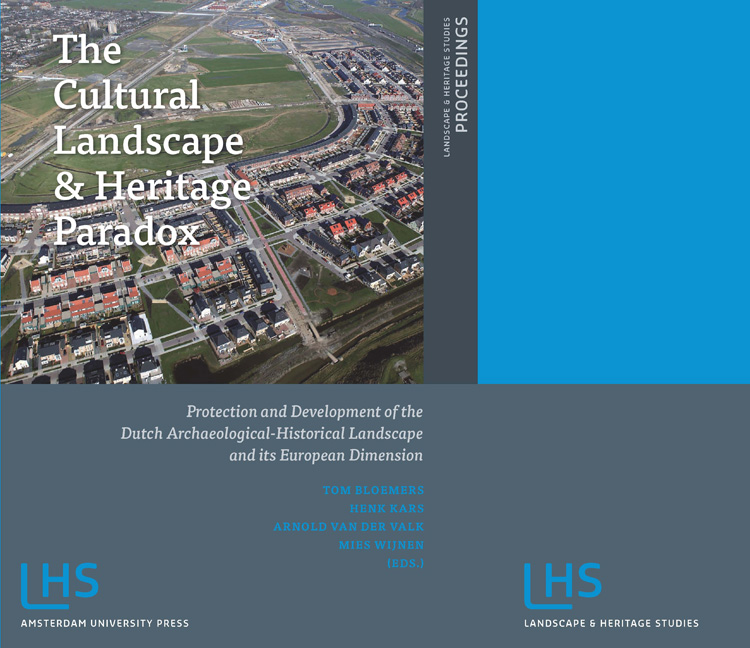 The Cultural Landscape and Heritage Paradox
The Cultural Landscape and Heritage Paradox Book contents
- Frontmatter
- Contents
- Preface
- I INTRODUCTION
- II INSIGHTS AND PROSPECTS OF ARCHAEOLOGICAL-HISTORICAL LANDSCAPE STUDIES
- III LINKING KNOWLEDGE AND ACTION
- IV IMAGINATION - FACTS AND CONSTRUCTIONS
- V SHARING KNOWLEDGE - STORIES, MAPS AND DESIGN
- VI SYNTHESIS AND CONCLUSIONS
- VII MANAGEMENT OF KNOWLEDGE
- VIII AGENDA FOR THE FUTURE
- IX SUMMARY
- X APPENDIX
- Subject Index
- Index of Places and Regions
3 - Changing Landscapes of Archaeology and Heritage
Published online by Cambridge University Press: 21 January 2021
- Frontmatter
- Contents
- Preface
- I INTRODUCTION
- II INSIGHTS AND PROSPECTS OF ARCHAEOLOGICAL-HISTORICAL LANDSCAPE STUDIES
- III LINKING KNOWLEDGE AND ACTION
- IV IMAGINATION - FACTS AND CONSTRUCTIONS
- V SHARING KNOWLEDGE - STORIES, MAPS AND DESIGN
- VI SYNTHESIS AND CONCLUSIONS
- VII MANAGEMENT OF KNOWLEDGE
- VIII AGENDA FOR THE FUTURE
- IX SUMMARY
- X APPENDIX
- Subject Index
- Index of Places and Regions
Summary
ABSTRACT
Florence and Faro (the European Landscape Convention and the Framework Convention on the Value of Cultural Heritage for Society) offer new lines of vision into archaeological heritage management. Unlike the Valletta Convention, neither of these two young conventions is specifically focused on archaeology and in fact the differences are much more fundamental. In conjunction with a more long-standing but recently maturing landscape dimension within heritage management and archaeologically/historically informed spatial planning, they offer a new context for archaeology and related disciplines. They open new channels into other landscape disciplines and into the integrated practice of landscape management. They suggest different approaches to understanding and responding to the past within the present. They expand the scale of theory and practice to the wider and more fluid concept of landscape itself, with a considerable impact therefore on conceptual frames. In three sections that look backwards, at current trends and at the future, and through the mirror of the PDL/BBO programme, this chapter explores the many faces that the ELC and the Faro Convention offer to archaeological practice, leading towards the introduction of a new European research agenda for ESF/COST focusing on landscape studies balanced between the humanities, the social sciences and the physical sciences.
KEY WORDS
Archaeology, heritage practice, landscape; ELC, social relevance, Faro; future
LANDSCAPES OF THOUGHT AND ACTION
Metaphorical landscapes: disciplinary contexts and changing situations.
Landscape can be object and subject, material as well as perceptual, metaphor as well as reality. Rather than dividing the field of research and practice, however, this diversity and multiplicity helps to provide a broad field of common ground. Landscape is above all a shared idea and creates an unparalleled nexus for debate, dialectic and difference within humanities and sciences. It is a place for researchers and practitioners from many varied fields to meet and discuss, using the idea of landscape as a virtual agora, thing or parlement, within which landscape meanings and significances can be contested as well as agreed. Landscape is an integrative force. It offers a way to dissolve some of the many divisions which have arisen in science, research, policy and practice over the past couple of centuries. This allows archaeologicalhistorical knowledge and policy to be set within wider social contexts through which they will reach new levels of relevance.
- Type
- Chapter
- Information
- The Cultural Landscape and Heritage ParadoxProtection and Development of the Dutch Archaeological-Historical Landscape and its European Dimension, pp. 653 - 670Publisher: Amsterdam University PressPrint publication year: 2010
- 4
- Cited by


